Communication Skills in Mental Healthcare: A Reflective Report
VerifiedAdded on 2021/05/31
|5
|1214
|19
Report
AI Summary
This report reflects on the crucial role of communication in mental healthcare, emphasizing the development of effective interpersonal skills for nurses. It highlights the challenges in communicating with mental health patients and their families, including issues like aggression, withdrawal, and the impact of stigmatization. The report details key communication skills, such as active listening, understanding nonverbal cues, the use of touch, and the strategic use of silence, and explains how these skills can build trust, foster therapeutic relationships, and empower patients. It emphasizes how these strategies can enhance the quality of life for patients and their families, supported by references to relevant research and literature. The report underscores the importance of these communication methods for improving patient care and outcomes in mental health settings.
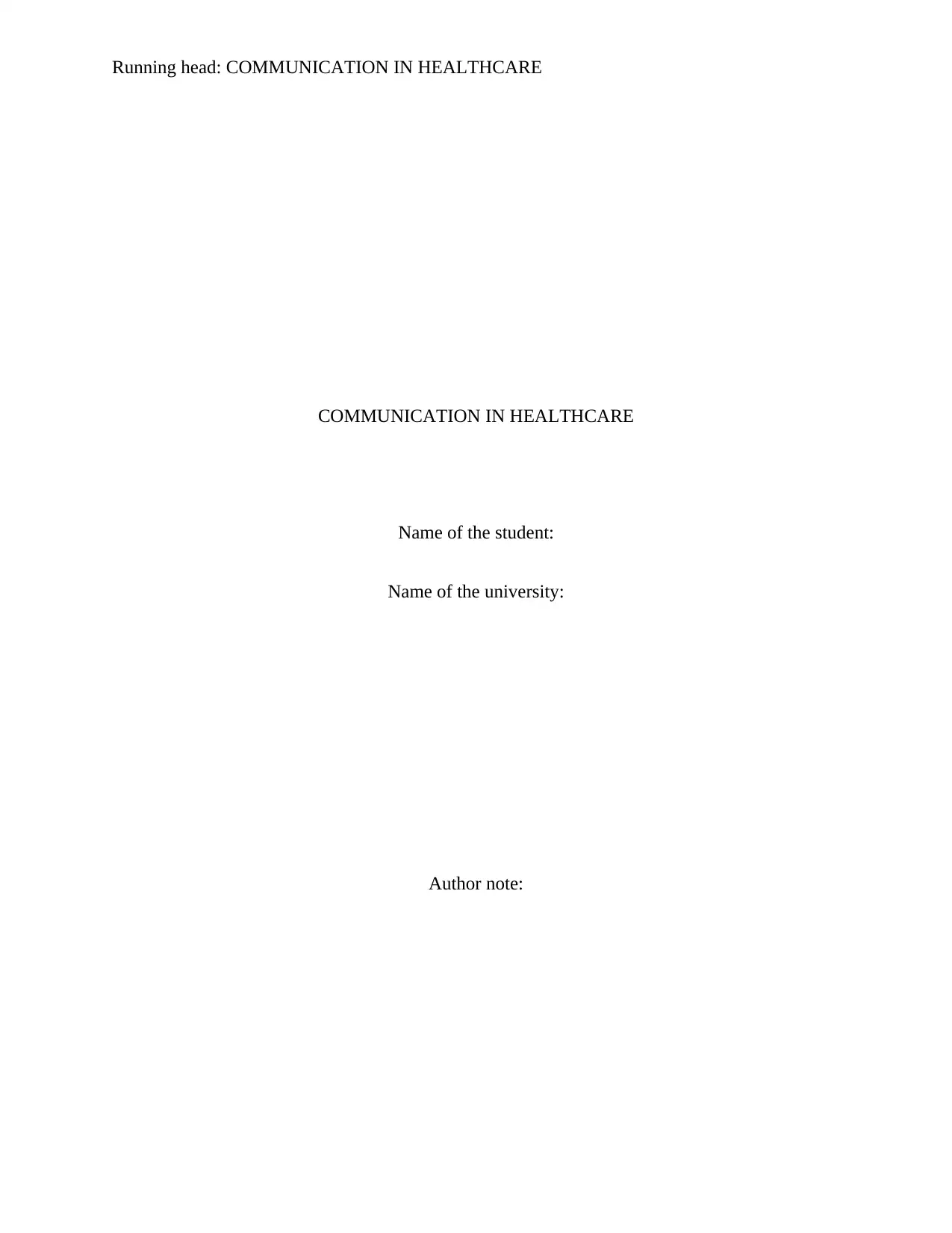
Running head: COMMUNICATION IN HEALTHCARE
COMMUNICATION IN HEALTHCARE
Name of the student:
Name of the university:
Author note:
COMMUNICATION IN HEALTHCARE
Name of the student:
Name of the university:
Author note:
Paraphrase This Document
Need a fresh take? Get an instant paraphrase of this document with our AI Paraphraser
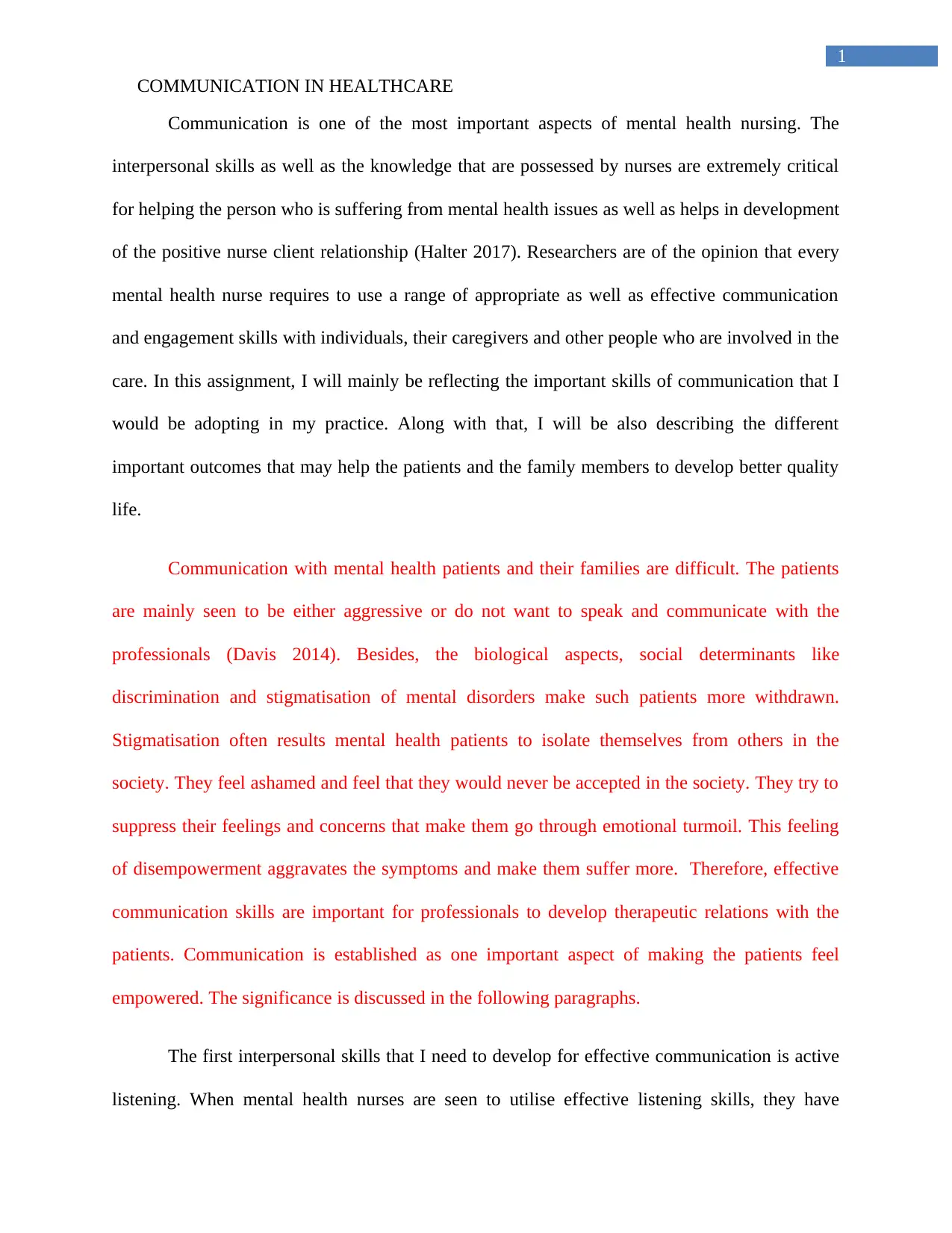
1
COMMUNICATION IN HEALTHCARE
Communication is one of the most important aspects of mental health nursing. The
interpersonal skills as well as the knowledge that are possessed by nurses are extremely critical
for helping the person who is suffering from mental health issues as well as helps in development
of the positive nurse client relationship (Halter 2017). Researchers are of the opinion that every
mental health nurse requires to use a range of appropriate as well as effective communication
and engagement skills with individuals, their caregivers and other people who are involved in the
care. In this assignment, I will mainly be reflecting the important skills of communication that I
would be adopting in my practice. Along with that, I will be also describing the different
important outcomes that may help the patients and the family members to develop better quality
life.
Communication with mental health patients and their families are difficult. The patients
are mainly seen to be either aggressive or do not want to speak and communicate with the
professionals (Davis 2014). Besides, the biological aspects, social determinants like
discrimination and stigmatisation of mental disorders make such patients more withdrawn.
Stigmatisation often results mental health patients to isolate themselves from others in the
society. They feel ashamed and feel that they would never be accepted in the society. They try to
suppress their feelings and concerns that make them go through emotional turmoil. This feeling
of disempowerment aggravates the symptoms and make them suffer more. Therefore, effective
communication skills are important for professionals to develop therapeutic relations with the
patients. Communication is established as one important aspect of making the patients feel
empowered. The significance is discussed in the following paragraphs.
The first interpersonal skills that I need to develop for effective communication is active
listening. When mental health nurses are seen to utilise effective listening skills, they have
COMMUNICATION IN HEALTHCARE
Communication is one of the most important aspects of mental health nursing. The
interpersonal skills as well as the knowledge that are possessed by nurses are extremely critical
for helping the person who is suffering from mental health issues as well as helps in development
of the positive nurse client relationship (Halter 2017). Researchers are of the opinion that every
mental health nurse requires to use a range of appropriate as well as effective communication
and engagement skills with individuals, their caregivers and other people who are involved in the
care. In this assignment, I will mainly be reflecting the important skills of communication that I
would be adopting in my practice. Along with that, I will be also describing the different
important outcomes that may help the patients and the family members to develop better quality
life.
Communication with mental health patients and their families are difficult. The patients
are mainly seen to be either aggressive or do not want to speak and communicate with the
professionals (Davis 2014). Besides, the biological aspects, social determinants like
discrimination and stigmatisation of mental disorders make such patients more withdrawn.
Stigmatisation often results mental health patients to isolate themselves from others in the
society. They feel ashamed and feel that they would never be accepted in the society. They try to
suppress their feelings and concerns that make them go through emotional turmoil. This feeling
of disempowerment aggravates the symptoms and make them suffer more. Therefore, effective
communication skills are important for professionals to develop therapeutic relations with the
patients. Communication is established as one important aspect of making the patients feel
empowered. The significance is discussed in the following paragraphs.
The first interpersonal skills that I need to develop for effective communication is active
listening. When mental health nurses are seen to utilise effective listening skills, they have
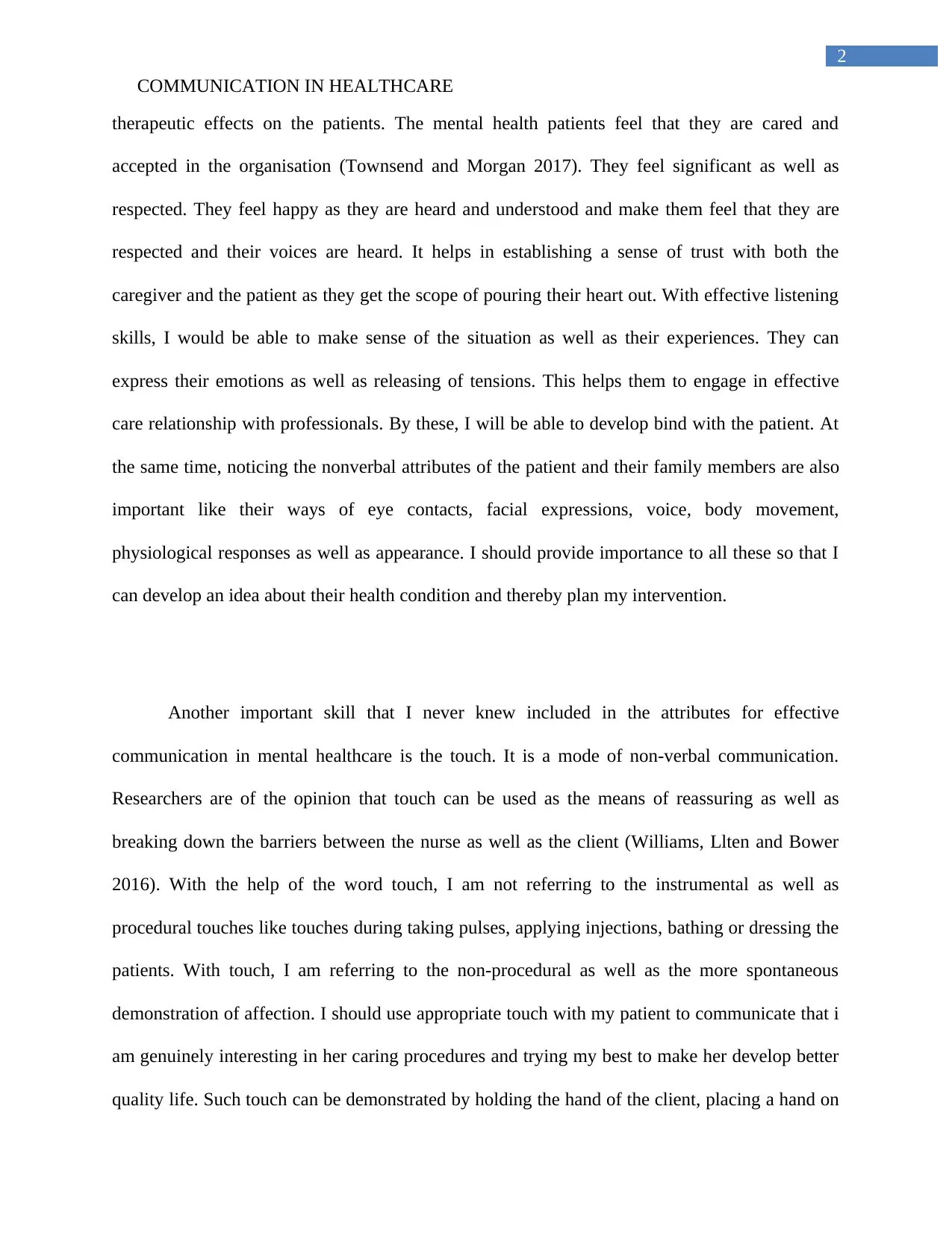
2
COMMUNICATION IN HEALTHCARE
therapeutic effects on the patients. The mental health patients feel that they are cared and
accepted in the organisation (Townsend and Morgan 2017). They feel significant as well as
respected. They feel happy as they are heard and understood and make them feel that they are
respected and their voices are heard. It helps in establishing a sense of trust with both the
caregiver and the patient as they get the scope of pouring their heart out. With effective listening
skills, I would be able to make sense of the situation as well as their experiences. They can
express their emotions as well as releasing of tensions. This helps them to engage in effective
care relationship with professionals. By these, I will be able to develop bind with the patient. At
the same time, noticing the nonverbal attributes of the patient and their family members are also
important like their ways of eye contacts, facial expressions, voice, body movement,
physiological responses as well as appearance. I should provide importance to all these so that I
can develop an idea about their health condition and thereby plan my intervention.
Another important skill that I never knew included in the attributes for effective
communication in mental healthcare is the touch. It is a mode of non-verbal communication.
Researchers are of the opinion that touch can be used as the means of reassuring as well as
breaking down the barriers between the nurse as well as the client (Williams, Llten and Bower
2016). With the help of the word touch, I am not referring to the instrumental as well as
procedural touches like touches during taking pulses, applying injections, bathing or dressing the
patients. With touch, I am referring to the non-procedural as well as the more spontaneous
demonstration of affection. I should use appropriate touch with my patient to communicate that i
am genuinely interesting in her caring procedures and trying my best to make her develop better
quality life. Such touch can be demonstrated by holding the hand of the client, placing a hand on
COMMUNICATION IN HEALTHCARE
therapeutic effects on the patients. The mental health patients feel that they are cared and
accepted in the organisation (Townsend and Morgan 2017). They feel significant as well as
respected. They feel happy as they are heard and understood and make them feel that they are
respected and their voices are heard. It helps in establishing a sense of trust with both the
caregiver and the patient as they get the scope of pouring their heart out. With effective listening
skills, I would be able to make sense of the situation as well as their experiences. They can
express their emotions as well as releasing of tensions. This helps them to engage in effective
care relationship with professionals. By these, I will be able to develop bind with the patient. At
the same time, noticing the nonverbal attributes of the patient and their family members are also
important like their ways of eye contacts, facial expressions, voice, body movement,
physiological responses as well as appearance. I should provide importance to all these so that I
can develop an idea about their health condition and thereby plan my intervention.
Another important skill that I never knew included in the attributes for effective
communication in mental healthcare is the touch. It is a mode of non-verbal communication.
Researchers are of the opinion that touch can be used as the means of reassuring as well as
breaking down the barriers between the nurse as well as the client (Williams, Llten and Bower
2016). With the help of the word touch, I am not referring to the instrumental as well as
procedural touches like touches during taking pulses, applying injections, bathing or dressing the
patients. With touch, I am referring to the non-procedural as well as the more spontaneous
demonstration of affection. I should use appropriate touch with my patient to communicate that i
am genuinely interesting in her caring procedures and trying my best to make her develop better
quality life. Such touch can be demonstrated by holding the hand of the client, placing a hand on
⊘ This is a preview!⊘
Do you want full access?
Subscribe today to unlock all pages.

Trusted by 1+ million students worldwide
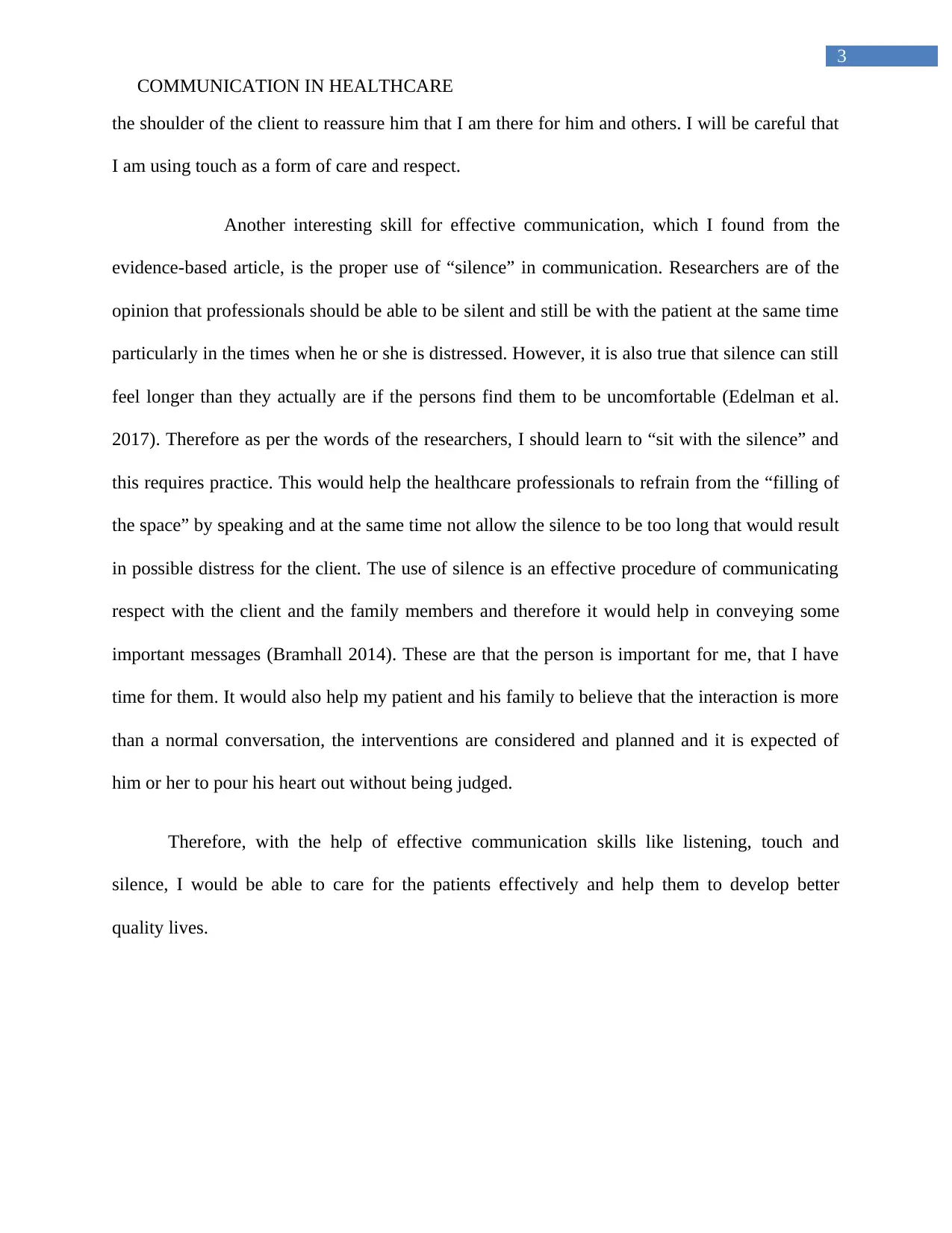
3
COMMUNICATION IN HEALTHCARE
the shoulder of the client to reassure him that I am there for him and others. I will be careful that
I am using touch as a form of care and respect.
Another interesting skill for effective communication, which I found from the
evidence-based article, is the proper use of “silence” in communication. Researchers are of the
opinion that professionals should be able to be silent and still be with the patient at the same time
particularly in the times when he or she is distressed. However, it is also true that silence can still
feel longer than they actually are if the persons find them to be uncomfortable (Edelman et al.
2017). Therefore as per the words of the researchers, I should learn to “sit with the silence” and
this requires practice. This would help the healthcare professionals to refrain from the “filling of
the space” by speaking and at the same time not allow the silence to be too long that would result
in possible distress for the client. The use of silence is an effective procedure of communicating
respect with the client and the family members and therefore it would help in conveying some
important messages (Bramhall 2014). These are that the person is important for me, that I have
time for them. It would also help my patient and his family to believe that the interaction is more
than a normal conversation, the interventions are considered and planned and it is expected of
him or her to pour his heart out without being judged.
Therefore, with the help of effective communication skills like listening, touch and
silence, I would be able to care for the patients effectively and help them to develop better
quality lives.
COMMUNICATION IN HEALTHCARE
the shoulder of the client to reassure him that I am there for him and others. I will be careful that
I am using touch as a form of care and respect.
Another interesting skill for effective communication, which I found from the
evidence-based article, is the proper use of “silence” in communication. Researchers are of the
opinion that professionals should be able to be silent and still be with the patient at the same time
particularly in the times when he or she is distressed. However, it is also true that silence can still
feel longer than they actually are if the persons find them to be uncomfortable (Edelman et al.
2017). Therefore as per the words of the researchers, I should learn to “sit with the silence” and
this requires practice. This would help the healthcare professionals to refrain from the “filling of
the space” by speaking and at the same time not allow the silence to be too long that would result
in possible distress for the client. The use of silence is an effective procedure of communicating
respect with the client and the family members and therefore it would help in conveying some
important messages (Bramhall 2014). These are that the person is important for me, that I have
time for them. It would also help my patient and his family to believe that the interaction is more
than a normal conversation, the interventions are considered and planned and it is expected of
him or her to pour his heart out without being judged.
Therefore, with the help of effective communication skills like listening, touch and
silence, I would be able to care for the patients effectively and help them to develop better
quality lives.
Paraphrase This Document
Need a fresh take? Get an instant paraphrase of this document with our AI Paraphraser
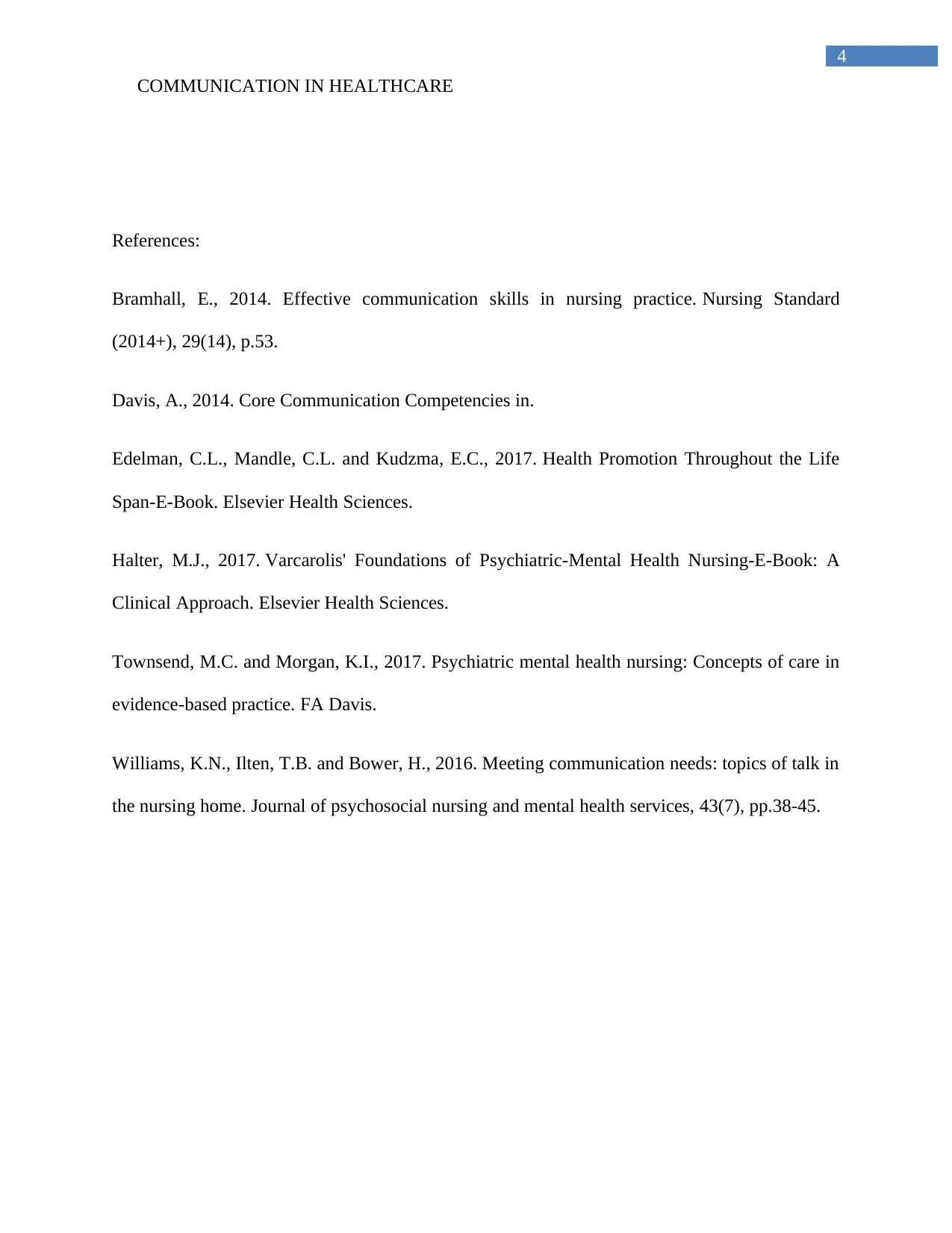
4
COMMUNICATION IN HEALTHCARE
References:
Bramhall, E., 2014. Effective communication skills in nursing practice. Nursing Standard
(2014+), 29(14), p.53.
Davis, A., 2014. Core Communication Competencies in.
Edelman, C.L., Mandle, C.L. and Kudzma, E.C., 2017. Health Promotion Throughout the Life
Span-E-Book. Elsevier Health Sciences.
Halter, M.J., 2017. Varcarolis' Foundations of Psychiatric-Mental Health Nursing-E-Book: A
Clinical Approach. Elsevier Health Sciences.
Townsend, M.C. and Morgan, K.I., 2017. Psychiatric mental health nursing: Concepts of care in
evidence-based practice. FA Davis.
Williams, K.N., Ilten, T.B. and Bower, H., 2016. Meeting communication needs: topics of talk in
the nursing home. Journal of psychosocial nursing and mental health services, 43(7), pp.38-45.
COMMUNICATION IN HEALTHCARE
References:
Bramhall, E., 2014. Effective communication skills in nursing practice. Nursing Standard
(2014+), 29(14), p.53.
Davis, A., 2014. Core Communication Competencies in.
Edelman, C.L., Mandle, C.L. and Kudzma, E.C., 2017. Health Promotion Throughout the Life
Span-E-Book. Elsevier Health Sciences.
Halter, M.J., 2017. Varcarolis' Foundations of Psychiatric-Mental Health Nursing-E-Book: A
Clinical Approach. Elsevier Health Sciences.
Townsend, M.C. and Morgan, K.I., 2017. Psychiatric mental health nursing: Concepts of care in
evidence-based practice. FA Davis.
Williams, K.N., Ilten, T.B. and Bower, H., 2016. Meeting communication needs: topics of talk in
the nursing home. Journal of psychosocial nursing and mental health services, 43(7), pp.38-45.
1 out of 5
Related Documents
Your All-in-One AI-Powered Toolkit for Academic Success.
+13062052269
info@desklib.com
Available 24*7 on WhatsApp / Email
![[object Object]](/_next/static/media/star-bottom.7253800d.svg)
Unlock your academic potential
Copyright © 2020–2026 A2Z Services. All Rights Reserved. Developed and managed by ZUCOL.




